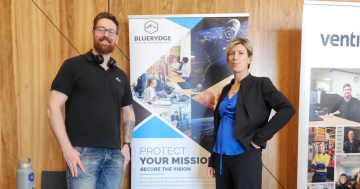Ashley Stahl* suggests ways employers can keep the ‘job-hopping’ Millennial generation connected to their work.
 Millennials (born between 1980 and 2000), often get a bad wrap in business for not being loyal to their employers.
Millennials (born between 1980 and 2000), often get a bad wrap in business for not being loyal to their employers.
Statistics show that at any one time, half of Millennials are actively seeking a new job, or are ready to make a change.
This characteristic has historically given the perception they aren’t committed to their work.
It’s quite the contrary.
First of all, this generation graduated with diplomas in hand and a load of student debt, only to run off the cliff of the Global Financial Crisis-induced recession
The opportunities during this time in the job market turned their resume into a graveyard of trials and errors.
Moreover, Millennials don’t want to settle for something that doesn’t fulfil them, and part of that means making sure they’re continuously growing in their careers.
Employers don’t always ensure this is happening.
It can’t be forgotten that commitment is a two-way street.
That’s why businesses need to evaluate where they’re misaligned with the needs of this generation.
I’m not placing blame; I am, however, pointing out that things can be improved.
It boils down to understanding what attracts Millennials to a specific workplace, how to leverage their needs, and how to retain them.
Here are five characteristics that Millennials look for in a job and how you can use them to keep this top talent committed.
Money isn’t a priority
This generation has largely reported they would be willing to take a pay cut for a better job.
When it comes to getting hired, six in 10 Millennials didn’t negotiate the financials at all.
They would rather have a job that pays too little than no job at all.
So, flashing a big dollar sign next to the job title isn’t going to be the main means of persuasion.
Millennials prefer a career that is more aligned with their core values, passion, and improvement of work-life balance.
Career growth is a constant necessity
The number one value for Millennials in their careers is development.
They seek to grow knowledge, experience, and expertise as quickly as possible.
Part of this is a result of trauma from being underpaid and under-employed during the recession.
This generation feels like they need to ‘catch up’ for their lost time.
The cost of that is on you, as an employer.
Timing is crucial for their careers
Millennials are often pegged as being entitled, but then again, every generation got a bad rap at some point.
Studies talked about how selfish Baby Boomers are, and how Generation-Xers are making a big mess.
Needless to say, the media likes to toast just about every generation.
We just tend to forget.
Overnight success is not something to strive for, but there is something to be said about being empowered to see what you want and go for it.
Millennials want to grow their careers quickly and don’t plan on putting in years and years of time to get what they want.
This is, again, largely due to the recession being hurtful for their careers.
The good news is that they’re willing to work hard in their job when they know it’s getting them somewhere, and they feel their employer is committed to growing them.
The bad news is that means you need to stay on your toes as an employer.
Upon hiring a Millennial employee, set up a meeting to discuss their career trajectory, and lay out a path that is aggressive yet attainable.
Also, be sure to ask what specifically motivates them, as knowing this is a key to your successful management.
If you’re a Gen-Xer or Baby Boomer, you probably think this is entitled, needy or narcissistic.
The truth of the matter is they’ll work harder than a lot of other hires if you’re able to spell this out for them.
Feedback is a reinforcement of their impact
In order to stay on track with their desired development and timing, feedback is a burning need.
One way to do this is through scheduling recurring check-ins with employees.
Gone are the days of annual performance reviews, and here are the days of frequent feedback.
Set up a weekly or monthly meeting to review projects and make sure they are receiving the support and feedback they yearn for to keep growing.
Having close relationships with co-workers in the office will further help retain employees, especially when you consider that Millennials are the loneliest generation.
Purpose is a core value
Millennials yearn to connect to an organisation’s missions and values.
Employers are missing the mark with this right now, as only 29 per cent of Millennials are engaged at work.
This disengagement often is catalysed when Millennial employees feel no connection to or ownership to the outcome of their work and actions.
Build a strong mission and embed your corporate values and culture into daily tasks.
Ensure that employees see the vision, and communicate with them to explore how they can personally match their growth and skills to the mission of the organisation.
Millennials are more likely to seek out employers with strong corporate social responsibility tied to them.
Take advantage of this fact by offering volunteer time off for employees, creating an internal committee dedicated to giving back through the business, and bringing environmental awareness and sustainability into the workplace.
The grass is often going to appear greener on the other side for Millennials.
As an employer, like it or not, your job is to never give them a reason to look at the other side.
*Ashley Stahl is a career coach, keynote speaker, podcast host and author. In a previous life she was award-winning counter-terrorism professional. She can be contacted at ashleystahl.com.
This article first appeared at forbes.com.











